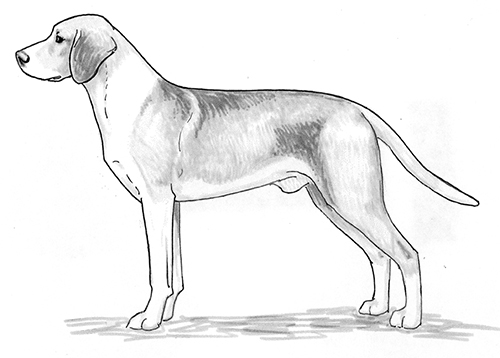Hygen Hound
Scenthound Group
The goals and purposes of this breed standard include: to furnish guidelines for breeders who wish to maintain the quality of their breed and to improve it; to advance this breed to a state of similarity throughout the world; and to act as a guide for judges.
Breeders and judges have the responsibility to avoid any conditions or exaggerations that are detrimental to the health, welfare, essence and soundness of this breed, and must take the responsibility to see that these are not perpetuated.
Any departure from the following should be considered a fault, and the seriousness with which the fault should be regarded should be in exact proportion to its degree and its effect upon the health and welfare of the dog and on the dog’s ability to perform its traditional work.
History
The Hygen Hound is a medium sized scenthound breed that originated in Norway.
The Hygen Hound was recognized by the United Kennel Club in 2006.
General Appearance
A medium sized, short coated hound that is solid and compact, slightly longer than tall, and has a strong topline.
Head
The head is moderately broad but not heavy. It is wedge shaped but never pointed.
SKULL
The skull is slightly domed. The occiput is not prominent. The stop is distinct.
MUZZLE
The muzzle is clean, broad and deep. It is rather short. The bridge of the muzzle is straight. Seen from the side, the end of the muzzle is rounded, not square. The lips are clean, not pendulous. The cheeks are clean and flat.
TEETH
The Hygen Hound has a complete set of evenly spaced, white teeth meeting in a scissors bite.
NOSE
Black.
EYES
The medium sized, dark brown eyes are not protruding. The expression is calm and earnest.
EARS
Medium high set, thin and soft, hanging not close to the cheeks. The ears reach hardly half way to the nose when pulled forward. They taper towards rounded tips.
Neck
Medium length and strong, not too throaty.
Forequarters
The shoulder blades are sloping, and form a good angle with the upper arms.
FORELEGS
The legs are clean, solid and sinewy, but not heavy. The pasterns are short, broad and slightly sloping.
Body
The chest is medium broad, long, deep and spacious. The back ribs are particularly well developed, making the ribcage appear long. The depth of the chest is about one half the height at the withers. The back is straight and strong and the loin is broad and muscular. The croup is broad and slightly rounded. The belly is very slightly tucked up.
Hindquarters
The hindquarters are muscular and broad.
HIND LEGS
The lower thighs are long. There is good angulation at the stifle and hock joints. The rear pasterns are short, broad and slightly sloping.
Feet
High, arched and well knit, with firm, strong pads. Well covered with hair between the toes.
Tail
The tail is set on level with the topline. It is thick at the root and tapers to the end, which reaches just to the hock joint. It is carried straight or in saber fashion.
Coat
Straight, dense, shiny and somewhat rough to the touch, not too short. The back of the thighs and the underside of the tail may have slightly more coat.
Color
Red-brown or yellow-red, often with black shading, with or without white markings. Black and tan, usually with white markings. Predominately white with patches and ticking of red-brown or yellow-red, or with black and tan markings. The colors should be clearly defined.
Height
The ideal height for males is 21 inches. For females, it is 20 inches.
Gait
Free, ground covering, and parallel.
Disqualifications
(A dog with a Disqualification must not be considered for placement in a conformation event, and must be reported to UKC.)
Unilateral or bilateral cryptorchid.
Viciousness or extreme shyness.
Albinism.

Looking for a Dog?
Find a dog that will fit your family.
Note: The breeders on this list are not endorsed by UKC.
©Copyright 2006, United Kennel Club
